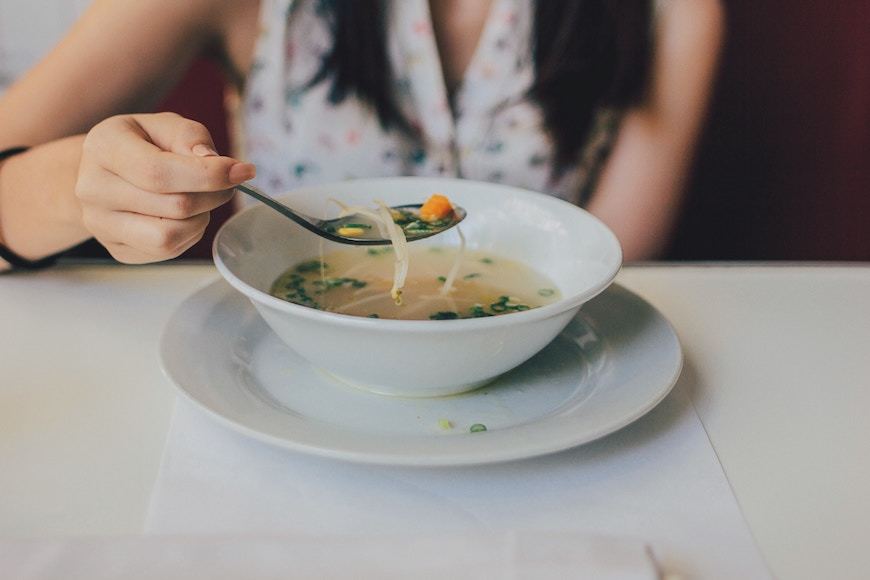If You’re a Woman, Here’s Why Your Gut Issues Aren’t Just in Your Head
For the wellness advocates at RenewLife®, makers of probiotic supplements formulated for women, it’s high time for us to similarly normalize the conversation about the gut issues that affect nearly 100 million women. (Feel free to collect your jaw off the floor after hearing that stunning number.)
It’s time for us to normalize the conversation about the gut issues that affect nearly 100 million women.
The reality is, on a daily basis, millions of women silently endure symptoms of gut imbalance including constipation, diarrhea, and discomfort after eating. "I would say the majority of the population has some degree of gut imbalance, due to a perfect storm of factors, such as excessive reliance on antibiotics, inflammatory foods in our diet, chronic stress, and the ubiquity of glyphosate (from the pesticide RoundUp) in our food and tap water," says holistic psychiatrist Ellen Vora, MD.
So what exactly does optimal gut health look like? According to Dr. Vora, it means you poop like clockwork every morning (TMI? Sorry not sorry), your stomach feels comfortable even after you eat, and you don't have heartburn, hemorrhoids, bloating, gas, burping, loose stools, or tiny rabbit poops.
Do any of those things describe your gut situation? Then you might want to listen up for four things everyone should know about women't gut-health issues—because they're definitely not in your head.
Scroll down for 4 eye-opening truths about women’s gut health.

1. Many women feel guilty about their gut issues—and ultimately go undiagnosed
When you're feeling bloated or constipated, you likely blame it on something you ate. Harmless, right? Not so much.
The trouble is, once you get in the habit of blaming your gut issues on your own choices, you don't go a step further to seek out a bigger explanation. And it's not just you: "Women tend to blame themselves for just about everything," Dr. Vora says. "We may think to ourselves: 'I didn’t eat cleanly enough, so now I pay the price. This is what I deserve.'"
The problem is exacerbated by the lack of conversation around common digestive issues. Because lets face it, you're probably more likely to discuss your latest Netflix binge than your hemorrhoids at happy hour. But next time you grab drinks with your gals, try asking what their gut health situations are like. Odds are, they're in a similar boat.
"We may think to ourselves: 'I didn’t eat cleanly enough, so now I pay the price. This is what I deserve.'"
"In particular with women's gut health, I think a lot of women have resigned themselves to having chronic gut dysfunction, thinking it’s inevitable or related to something seemingly out of their control, such as their menstrual cycle or their stress levels," she says.
Even though women are more likely than men to experience chronic digestive diseases such as irritable bowel syndrome, according to recent studies, they're just as likely to sweep gut-related symptoms under the rug. “For one thing, these signs of gut imbalance are so common in modern life, a lot of us just assume it’s normal,” Dr. Vora says. Newsflash: It's not.

2. Gut problems aren't limited to your digestive system
When you pop your daily probiotic, you’re doing more than a solid for your gut. By introducing multiple high-quality strains of good bacteria into your microbiome, you’re helping to boost your overall wellbeing, from your skin to your energy levels.
But the connection between your breakouts or energy dips and an imbalance in your gut isn't always an obvious one. The misconception that “digestive issues are limited to the digestive tract” is another factor keeping women from getting a proper diagnosis, Dr. Vora says.
“We think that if we have bloating or diarrhea, it means our gut is unhealthy, but we fail to recognize that it has profound downstream ramifications for our health,” she says. “That dysfunction is not limited to your gut, but in fact impacts your mental health, your hormones, your period, your skin, your joints, your energy, your immunity, your risk of developing an autoimmune disease, and just about everything else.”

3. Women’s microbiomes are different than men’s
Comparing your gut issues to your boyfriend or little brother’s ironclad stomach is a lost cause. Your gut as a woman will be inherently different.
“For one thing, women’s gut microbiomes shift with our cycles,” Dr. Vora explains. In addition, your gut flora is impacted by female-focused products including makeup, perfume, and birth control, and it can also be affected by female-specific life events such as pregnancy.
Bottom line: Your gut-health issues aren’t just about what you eat and do for your body. There are many factors—that are often out of your hands—affecting your flora.

4. You can do something to alleviate your symptoms
Though it can feel like women got the short end of the stick when it comes to optimizing their gut health, there are steps that can be taken to alleviating your symptoms—because you definitely shouldn't have to just live with them.
Dr. Vora recommends taking small steps such as avoiding inflammatory foods, increasing gut-healing foods such as bone broth, ghee, and fermented foods (or a probiotic supplement), and taking the time to chew thoroughly.
"Without putting the pressure and guilt of 'clean eating' on yourself, it is worth recognizing that you can go a long way toward healing your gut by following your body’s intuition and shifting your food choices toward foods that agree with your body," she says. "Basically it’s all an art of listening to your body and being gentle with it."
In partnership with RenewLife®
Top photo: Stocksy/ Boris Jovanovic
Loading More Posts...